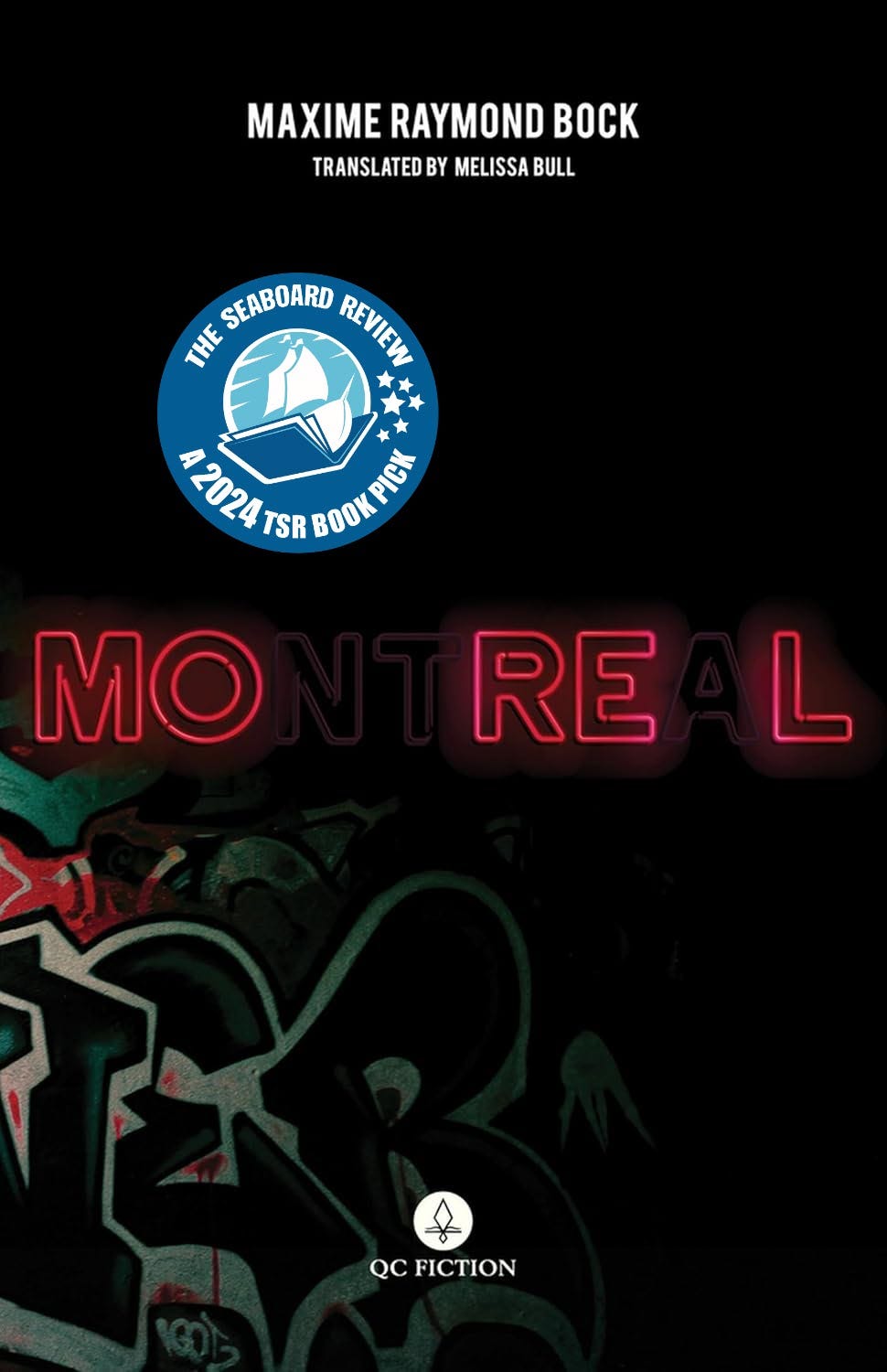Morel by Maxime Raymond Bock, Translated by Melissa Bull
A Review by James M. Fisher
Morel is an astounding book. Jean-Claude Morel is the epitome of a working-class family man, born and raised in poverty in Montreal's busy, dirty, post-war industrial port, under the constant watch of the Jacques-Cartier Bridge.
“They consider the crumbling duplexes and triplexes, standing only because they lean on one another, to be their own. The dark, slanted roofs, some patched with tarred cardboard, cut a linear formation along the grid of streets, but the backs of the houses indent the asymmetrical space of the inner courtyards where their families hunker in fire traps and makeshift rentals. Here and there, clumps of trees, a park, a plant storefront, a solitary maple resist the encroachment of grey and black suffocating the area.”
While I am not overly familiar with Montreal, either then or now, Mr. Bock describes it so well in such infinite detail that I could not help but be transported to the back alleys, shacks, and street corners of Jean-Claude’s neighbourhoods.
"An astounding book . . . a mini-epic of an ordinary man, and a time capsule of post-war Montreal with all its problems, economic, political, and environmental. I highly recommend it."
Jean-Claude describes himself as “…lucky, much luckier than so many others, he’s still tough…” And “tough” he is, having worked construction for over 40 years, experienced the premature death of his father (Morel found him sprawled on the kitchen floor, dead from a cardiac episode), births, marriages, pregnancies, his own dysfunctional family after the death of his youngest, a divorce, and on it goes. But Jean-Claude always manages to cope, although not always well, especially after the death of little Jeannine. His work is the source of his pride, having worked on just about every construction site in the city over the years: Place Ville Marie, the Olympic Stadium, the métro, and more.
He has seen his neighbourhood torn down (and has been evicted in the process), and forced to move, but not far, and not to better places.
“…there wasn’t any reason to complain about anything other than rats. They’d learned how to make the most of their lot, which was impossible to improve.”
A sensitively written novel, Morel contains enough of a life for anyone. Still, it celebrates the everyday men and women who struggled against urban poverty, raised families, and built (and rebuilt) a city. I particularly appreciated how Mr. Bock segued one chapter’s ending with the beginning of another, even though it is set in a different moment in Jean-Claude’s life. At first, I found it a little disorienting, but quickly caught on and it added to the overall enjoyment of reading Morel.
“He is, indeed, alone with his memories, which only resurface out of order. One tangle of unpredictable scenes followed haphazardly by another, as memories do, with dead ends, threadless plots, unresolved narratives, and unexpected disappearances, impromptu triggers, deep relationships becoming suddenly superficial.”
That’s exactly how Morel is written: memories resurfaced out of order, as memories do. Something triggers a particular memory, and we are transported in time. An excellent example comes later in the book when Jean-Claude, now retired and alone, visits a bar where he naturally befriends Lorenzo, the bartender. Getting quite tipsy, Lorenzo helps him out of the bar to the street. The chapter ends. The next chapter begins with a younger Jean-Claude in the same condition on a Friday night with his Greek friend and co-worker Simatos driving him home to his family. It is a great writing device, and Mr. Bock knows this well, but it is odd at first to read a novel plotted out in this manner. Kudos to him!
QC Fiction is highly proficient at finding important books written in French and having them translated into English to reach a wider audience. Morel is no exception. It is a vital book, a mini-epic of an ordinary man, and a time capsule of post-war Montreal with all its problems, economic, political, and environmental. I highly recommend this book to anyone, but those most familiar with the city and its neighbourhoods will get additional insights into Mr. Bock’s Montreal.
About the Author and Translator
Maxime Raymond Bock was born in Montreal, where he lives today. His first book, a collection of short stories, won the Prix Adrienne-Choquette and was published by Dalkey Archive Press as Atavisms in 2015. Baloney, a novella, was published by Coach House Books in 2016. Morel, his début novel, was a finalist for the Prix des libraires, Prix littéraire des collégiens, Grand Prix du livre de Montréal, Prix Senghor and the Rendez-vous du premier roman.
Melissa Bull is a half-franco, half-anglo writer, editor, and translator. She is the author of a collection of poetry, Rue, and a collection of fiction, The Knockoff Eclipse. Melissa is the translator of Pascale Rafie's play, The Baklawa Recipe, Nelly Arcan's collection Burqa of Skin, and Marie-Sissi Labrèche's novel, Borderline. Melissa has a BA in Creative Writing from Concordia University and an MFA in Creative Writing from UBC. She lives in Montreal.
Publisher : QC Fiction (June 1 2024)
Language : English
Paperback : 280 pages
ISBN-10 : 1771863374
ISBN-13 : 978-1771863377
This review is based on an Advance Reading Copy supplied by QC Fiction in exchange for a fair review.




